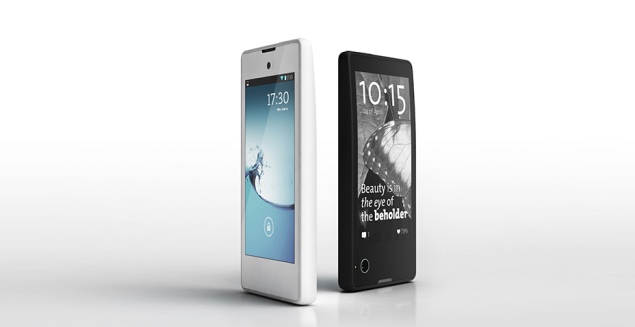- Home
- Mobiles
- Mobiles News
- Russia's YotaPhone double sided Android E Ink smartphone starts shipping
Russia's YotaPhone double-sided Android E-Ink smartphone starts shipping

Oil-rich Russia is a major market for foreign handset makers such as Apple and Samsung Electronics, but it has so far not been successful in designing handsets.
Moscow-based Yota Devices plans to sell the phone in 20 countries next year after making its 2013 debut in Russia, Austria, France, Germany and Spain.
"If we really hit the mark, we'll be happy because in two to three years everyone will be copying us," said Yota Device's Chief Executive Vlad Martynov, referring to the success of Apple's iPhones since their launch in 2007. He currently has no plans to launch in the competitive U.S. market.
Analysts were sceptical, predicting it will struggle to emulate the success of Apple's iPhone or Samsung's Galaxy smartphone.
"In people's minds Yota Devices is a no-name company, it's not Samsung or Nokia or Apple, which all have their fans. No one will be expecting a YotaPhone," said Denis Kuskov, analyst at research firm TelecomDaily.
"At best, the sales will be limited to several tens of thousands in 2014. The company is focused on developing one model and big production costs clearly won't be covered."
The YotaPhone, assembled in China from components made in Japan and Taiwan, features a backlit liquid crystal display (LCD) screen on one side and an electronic paper display designed to mimic the appearance of ordinary ink on paper, which is always switched on.
"It's a new type of gadget. With smartphones it's always one problem - its display is always black, it always sleeps, which we think is fundamentally wrong," Martynov said, pointing at the smartphone's front screen.
The electronic paper screen can stream social media, text messages, maps, weather and breaking news. It also works as an e-book.
The phone, based on Google's Android mobile operating system, will be available for 19,990 roubles in Russian stores against a price of around 29,000 roubles for Apple's iPhone 5c with the same memory.
In Europe and the United Arab Emirates the YotaPhone will be available for 499 euros and $600, respectively.
Yota has received about 10,000 pre-orders, mostly from Russia, Martynov said.
Sales of smartphones in Russia exceeded sales of mobile phones for the first time in November, Russia's top phone retailer Euroset said last week. In monetary terms smartphones accounted for 85 percent of the market, it added.
Yota Devices, majority owned by Russian investment fund Wooden Fish, was spun off from wireless internet provider Yota, also known as Scartel, in 2011, ahead of a deal that saw Russia's No.2 mobile operator Megafon buy Scartel for $1.2 billion.
© Thomson Reuters 2013
Mobiles launched in December 2013
For the latest tech news and reviews, follow Gadgets 360 on X, Facebook, WhatsApp, Threads and Google News. For the latest videos on gadgets and tech, subscribe to our YouTube channel. If you want to know everything about top influencers, follow our in-house Who'sThat360 on Instagram and YouTube.
Related Stories
- Samsung Galaxy Unpacked 2025
- ChatGPT
- Redmi Note 14 Pro+
- iPhone 16
- Apple Vision Pro
- Oneplus 12
- OnePlus Nord CE 3 Lite 5G
- iPhone 13
- Xiaomi 14 Pro
- Oppo Find N3
- Tecno Spark Go (2023)
- Realme V30
- Best Phones Under 25000
- Samsung Galaxy S24 Series
- Cryptocurrency
- iQoo 12
- Samsung Galaxy S24 Ultra
- Giottus
- Samsung Galaxy Z Flip 5
- Apple 'Scary Fast'
- Housefull 5
- GoPro Hero 12 Black Review
- Invincible Season 2
- JioGlass
- HD Ready TV
- Laptop Under 50000
- Smartwatch Under 10000
- Latest Mobile Phones
- Compare Phones
- Vivo Y300i
- Realme 14 5G
- Poco F7 Ultra
- Poco F7 Pro
- Samsung Galaxy M05
- Vivo Y39 5G
- Samsung Galaxy M06 5G
- Samsung Galaxy M16 5G
- Acer TravelLite (2025)
- Asus Zenbook 14 (2025)
- Honor Pad X9a
- Lenovo Idea Tab Pro
- boAt Storm Infinity
- Itel Unicorn Max
- Haier M95E
- Sony 65 Inches Ultra HD (4K) LED Smart TV (KD-65X74L)
- Sony PlayStation 5 Pro
- Sony PlayStation 5 Slim Digital Edition
- Blue Star 1.5 Ton 3 Star Inverter Split AC (IC318DNUHC)
- Blue Star 1.5 Ton 3 Star Inverter Split AC (IA318VKU)

















